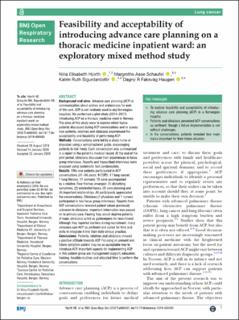| dc.contributor.author | Hjorth, Nina Elisabeth | |
| dc.contributor.author | Schaufel, Margrethe Aase | |
| dc.contributor.author | Sigurdardottir, Katrin Rut | |
| dc.contributor.author | Haugen, Dagny Faksvåg | |
| dc.date.accessioned | 2021-04-12T10:32:02Z | |
| dc.date.available | 2021-04-12T10:32:02Z | |
| dc.date.created | 2020-07-17T13:43:01Z | |
| dc.date.issued | 2020 | |
| dc.identifier.issn | 2052-4439 | |
| dc.identifier.uri | https://hdl.handle.net/11250/2737283 | |
| dc.description.abstract | Background and aims: Advance care planning (ACP) is communication about wishes and preferences for end-of-life care. ACP is not routinely used in any Norwegian hospitals. We performed a pilot study (2014–2017) introducing ACP on a thoracic medicine ward in Norway. The aims of this study were to explore which topics patients discussed during ACP conversations and to assess how patients, relatives and clinicians experienced the acceptability and feasibility of performing ACP.
Methods: Conversations were led by a study nurse or physician using a semistructured guide, encouraging patients to talk freely. Each conversation was summarised in a report in the patient’s medical record. At the end of the pilot period, clinicians discussed their experiences in focus group interviews. Reports and transcribed interviews were analysed using systematic text condensation.
Results: Fifty-one patients participated in ACP conversations (41–86 years; 9 COPD, 41 lung cancer, 1 lung fibrosis; 11 women); 18 were accompanied by a relative. Four themes emerged: (1) disturbing symptoms, (2) existential topics, (3) care planning and (4) important relationships. All participants appreciated the conversations. Clinicians (1 physician and 7 nurses) participated in two focus group interviews. Reports from ACP conversations revealed patient values previously unknown to clinicians; important information was passed on to primary care. Fearing they would deprive patients of hope, clinicians acted as gatekeepers for recruitment. Although they reported barriers during recruitment, many clinicians saw ACP as pertinent and called for time and skills to integrate it into their daily clinical practice.
Conclusions: Patients, relatives and clinicians showed a positive attitude towards ACP. Focusing on present and future symptom control may be an acceptable way to introduce ACP. Important aspects for implementing ACP in this patient group are management support, education, training, feasible routines and allocated time to perform the conversations. | en_US |
| dc.language.iso | eng | en_US |
| dc.publisher | BMJ Publishing Group | en_US |
| dc.rights | Navngivelse-Ikkekommersiell 4.0 Internasjonal | * |
| dc.rights.uri | http://creativecommons.org/licenses/by-nc/4.0/deed.no | * |
| dc.title | Feasibility and acceptability of introducing advance care planning on a thoracic medicine inpatient ward: an exploratory mixed method study | en_US |
| dc.type | Journal article | en_US |
| dc.type | Peer reviewed | en_US |
| dc.description.version | publishedVersion | en_US |
| dc.rights.holder | Copyright Author(s) (or their employer(s)) 2020 | en_US |
| dc.source.articlenumber | e000485 | en_US |
| cristin.ispublished | true | |
| cristin.fulltext | original | |
| cristin.qualitycode | 1 | |
| dc.identifier.doi | 10.1136/bmjresp-2019-000485 | |
| dc.identifier.cristin | 1819722 | |
| dc.source.journal | BMJ Open Respiratory Research | en_US |
| dc.identifier.citation | BMJ Open Respiratory Research. 2020, 7 (1), e000485. | en_US |
| dc.source.volume | 7 | en_US |
| dc.source.issue | 1 | en_US |

